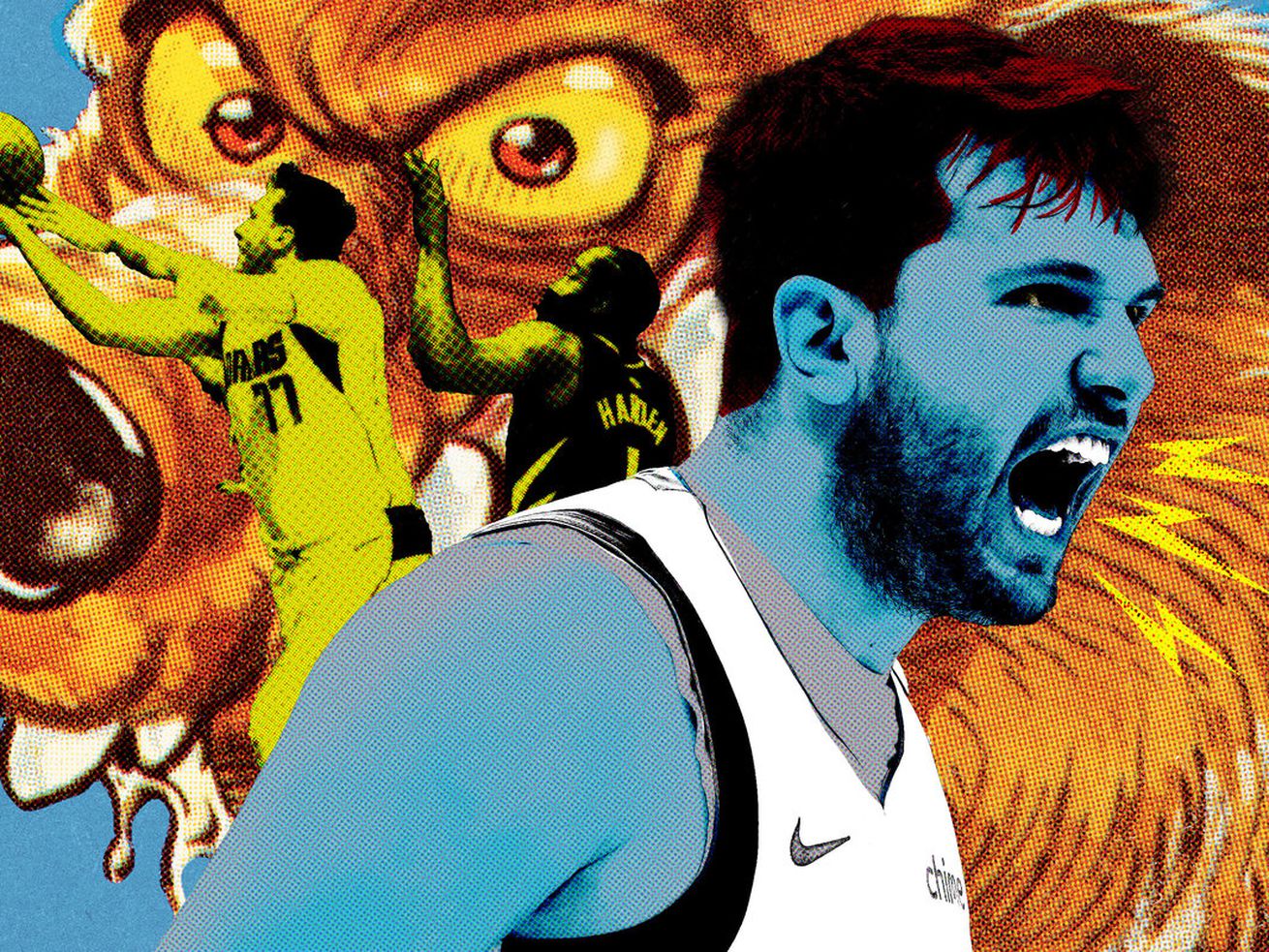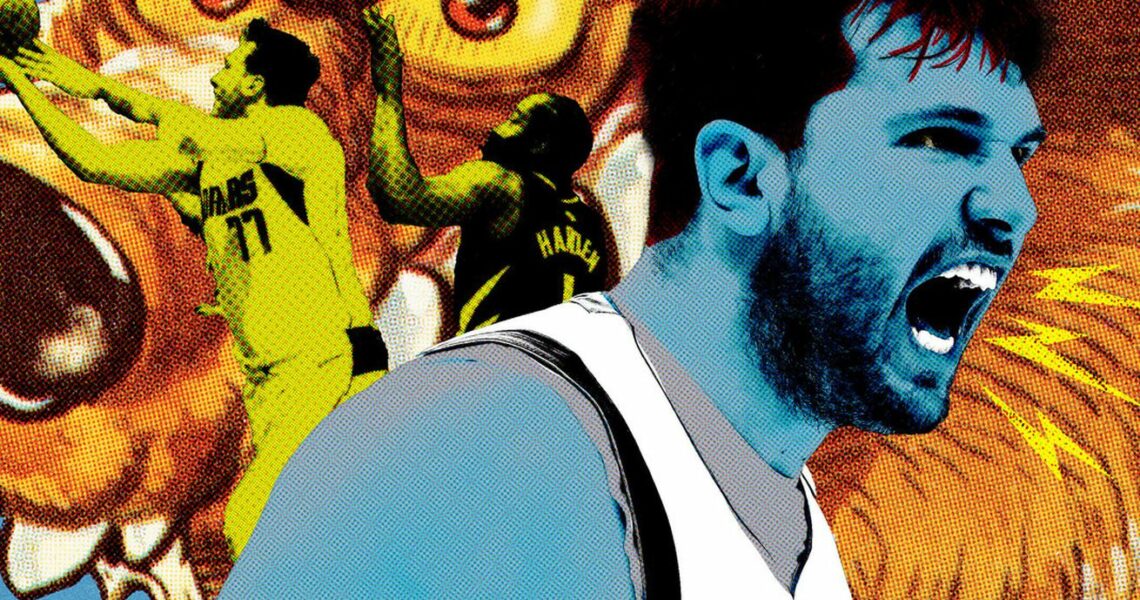
We know the Dallas Mavericks superstar can score, but it’s his growth in other areas that carried the Mavs in Game 2 against the Los Angeles Clippers—and that will ultimately determine how far they can go
It looked, for one nerve-racking moment on Tuesday, like the Los Angeles Clippers had Luka Doncic right where they wanted him: boxed in by Paul George, James Harden, and the baseline—backed into a corner under his own basket, holding on to the ball and a three-point lead with 20 seconds to go.
But pressure, for Doncic, has always been a creative hotbed. He faked a pass, duping George into the air, escaped the trap with a step-through, then jumped and threaded a 40-foot bounce pass between two defenders to Kyrie Irving. Irving raced up the floor, killing the clock and the Clippers’ Game 2 comeback hopes.
Irving never looked like he doubted the accuracy of the pass or the judgment of the thrower. Neither did Dallas coach Jason Kidd. “You trust your quarterback,” Kidd said after his team evened the series at 1-1. “He makes a lot of passes a lot of people can’t make.”
What’s risky for everyone else has long been routine for Doncic. And what’s routine for others—from rotating to shooters on the wing to keeping emotions in check—has historically been more difficult for Doncic. It was in these facets, which so many of the Mavericks’ title hopes hinge on, that Doncic showed the most meaningful improvements in Game 2.
The book on Doncic, historically: He can make reads ahead of time, but sudden bursts of emotion can drag him behind the action. He’ll forgo transition defense in order to berate referees for what he perceives as missed calls.
Late in the third quarter of Game 2, Doncic’s frustration once again distracted him. After a steady stream of complaining and staring down the referees, he finally picked up a technical foul—his first in two months—at the end of the quarter, allowing the Clippers to enter the fourth with a one-point lead. He’s had a tendency to spiral in these moments, to let his game turn into an exercise of arm-raising disbelief and brazen I’ll-show-you stepback 3s. To complicate matters, they often fall through the hoop.
“He’s a very competitive guy,” Mavericks forward Maxi Kleber told The Ringer. “Stuff like that just gets him going even more. He lives for that. Obviously not ideal, you obviously don’t want to give opponents free throws, but he thrives in those moments.”
What works every few games, though, isn’t a sustainable season-wide strategy, and Doncic has gotten better at understanding that. The tendency to show up “whenever people test him,” as Kleber put it, manifested in a unique way on Tuesday.
The Clippers’ gauntlet of Hall of Fame wings spent large, unfruitful chunks of the game seeking out perceived mismatches against Doncic. With less than five minutes left, Derrick Jones Jr. came over to help Doncic double George, who swung the ball to Harden, who found a wide-open Russell Westbrook for a 3. As the shot dropped through the rim, Doncic waved his arms in frustration, imploring his teammates not to send double-teams to help him. On the next play, George tried pushing off Doncic to create separation and ultimately missed a contested jumper. Afterward Doncic was a beat behind the action on offense, but not because he was complaining to a ref. He was staring daggers at his own coaching staff. After the game, he told TNT’s Jared Greenberg, “They’re trying to double with me and I say no double. I take pride in my defense, too.”
Luka Doncic on his defense tonight:
“It’s playoffs. It’s different. They’re trying to double with me and I say no double. I take pride in my defense too. They’re always going to say that – the haters. But it’s fine. I’m out here enjoying playing basketball. That’s fun man.” pic.twitter.com/IZQWqawkUX
— Noah Weber (@noahweber00) April 24, 2024
For years, the Mavericks have tried surrounding Doncic with plus defenders in hopes of offsetting his weaknesses. The formula has resulted in failure, by way of either too little offensive firepower or too many holes. The rejuvenated Mavericks defense—no. 1 in the league in the final 15 games of the season—has many authors: a deadline deal that brought in Daniel Gafford’s rim protection and P.J. Washington’s gangly perseverance, Kidd’s commitment to Jones as a big-minute starter, the rise of Josh Green. But Doncic’s (and Irving’s) commitment to the dirty work has been a major contributor to the balance that’s finally been created in Dallas. Before escaping L.A. with a 96-93 victory, the Mavericks were 0-10 this season in games in which they scored 103 or fewer points, suggesting they are able to adapt to the increased physicality of the playoffs.
“Ever since March, we could see there was a shift in officiating,” Kidd said. “Less whistles and the physicality has stepped up, and we embraced it. That’s who we are.”
Indeed, the Mavericks seem to have figured out who they are at the right time. Like the Clippers, they have a ton of lineup variability around their stars and the option to go small, like they did late in Game 2, leaning on Kleber’s ground-bound 3-point shooting and steady screening. That forced Clippers center Ivica Zubac out of the paint and opened more space for Doncic to cook on isos or in the two-man game with Kyrie.
Ty Lue, on the other hand, toggled between big and small. Early in the fourth quarter, he tried to get Westbrook a breather, only for the lull in defensive intensity to lead to a game-changing seven-point swing for the Mavericks. Westbrook was a game-high plus-8 but played just 24 minutes, perhaps owing to the fact that Kleber and Co. were ignoring him from beyond the arc and clogging the paint. Maybe that’s why Lue tried going small before finally settling on a final rotation, pairing Westbrook and Zubac alongside the Big Three. But that wasn’t enough for them to pull off a win.
The easy variability of the Clippers’ midseason is now an advantage for Dallas, and with Kawhi Leonard working his way back from a knee injury, the Mavericks also have the star power advantage. If Leonard was hoping to ease his way into the action by targeting Doncic, he was in for a rude awakening. So was the rest of the roster. The Clippers, according to ESPN’s Tim MacMahon, went 2-for-17 against him. One of those two field goals was a late-game 3 on a switch botched by Jones. Leonard found his legs as the game progressed, and just how quickly he can work himself back into form will be a huge determinant in the series, which, early on, looks like it will be defined by big-game scorers with deep isolation bags. So will the fact that, if Doncic and Irving maintain their defensive identity, the Mavericks will have precious few weaknesses for Harden to exploit through table setting.
Doncic himself needed 26 shots to get to 32 points, and his technical foul was a reminder that while he is displaying the hallmarks of growth, he is still, well, growing. Doncic is in his sixth season now, around the time when great players learn how to accept, ameliorate, and minimize the impact of their weaknesses. It took Michael Jordan, Nikola Jokic, and LeBron James seven, eight, and nine years, respectively, to get over the hump and lead their teams to titles. I can’t help but have doubts about whether Doncic will have the stamina to keep this up for three more games, let alone four playoff rounds. But layer by layer, he is shedding his imperfections.

